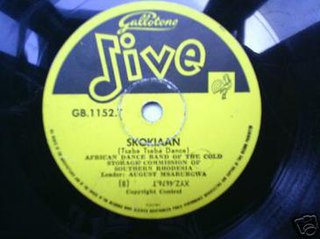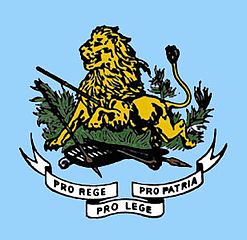Related Research Articles

Zimbabwean music is heavily reliant on the use of instruments such as the mbira, Ngoma drums and hosho. Their music symbolizes much more than a simple rhythm, as the folk and pop style styled music was used as a symbol of hope for Zimbabweans looking to gain independence from Rhodesia. Music has played a significant role in the history of Zimbabwe, from a vital role in the traditional Bira ceremony used to call on ancestral spirits, to protest songs during the struggle for independence. The community in Zimbabwe used music to voice their resistance to their oppression, as one of the only weapons they had available to fight back with. In the eighties, the Music of Zimbabwe was at the center of the African Music scene thanks to genres such as Sungura and Jit. However, several performers were banned by state TV and radio leading to the closing of several music venues.

Southern Rhodesia was a landlocked self-governing British Crown colony in southern Africa, established in 1923 and consisting of British South Africa Company (BSAC) territories lying south of the Zambezi River. The region was informally known as south Zambesia until annexed by Britain at the behest of Cecil Rhodes's British South Africa Company, for whom the colony was named. The bounding territories were Bechuanaland (Botswana), Northern Rhodesia (Zambia), Portuguese Mozambique (Mozambique), and the Transvaal Republic.

The Zimbabwe Republic Police (ZRP) is the national police force of Zimbabwe, having succeeded the British South Africa Police on 1 August 1980.

The British South Africa Police (BSAP) was, for most of its existence, the police force of Southern Rhodesia and Rhodesia. It was formed as a paramilitary force of mounted infantrymen in 1889 by Cecil Rhodes' British South Africa Company, from which it took its original name, the British South Africa Company's Police. Initially run directly by the company, it began to operate independently in 1896, at which time it also dropped "Company's" from its name. It thereafter served as Rhodesia's regular police force, retaining its name, until 1980, when it was superseded by the Zimbabwe Republic Police, soon after the country's reconstitution into Zimbabwe in April that year.

"Skokiaan" is a popular tune originally written by Zimbabwean musician August Musarurwa in the "tsaba-tsaba" big band-style that succeeded Marabi. "Skokiaan" is an illegal self-made alcoholic beverage.

The Rhodesian African Rifles (RAR) was a regiment of the Rhodesian Army. The ranks of the RAR were recruited from the black African population, although officers were generally from the white population. The regiment was formed in May 1940 in the British colony of Southern Rhodesia.

The Zimbabwe national rugby union team, nicknamed the Sables, represents the Zimbabwe Rugby Union in international competition. While sides representing the colony of Rhodesia have played as early as 1910, the modern day Zimbabwe rugby team did not play its first test until 1981, against Kenya. Zimbabwe has competed in two World Cups, in 1987 and 1991, in place of South Africa, who were sanctioned by the IRB at the time due to apartheid. Zimbabwe is categorized as Tier 3 Development One, which prioritizes Zimbabwe over other nations due to historical success as well as popularity of rugby in the nation.

The First Matabele War was fought between 1893 and 1894 in modern-day Zimbabwe. It pitted the British South Africa Company against the Ndebele (Matabele) Kingdom. Lobengula, king of the Ndebele, had tried to avoid outright war with the company's pioneers because he and his advisors were mindful of the destructive power of European-produced weapons on traditional Matabele impis attacking in massed ranks. Lobengula reportedly could muster 80,000 spearmen and 20,000 riflemen, armed with Martini-Henry rifles, which were modern arms at that time. However, poor training may have resulted in the weapons not being used effectively.

The Second Matabele War, also known as the First Chimurenga, was fought in 1896 and '97 in the region later known as Southern Rhodesia, now modern-day Zimbabwe. It pitted the British South Africa Company against the Matabele people, which led to conflict with the Shona people in the rest of Southern Rhodesia.

The military history of Zimbabwe chronicles a vast time period and complex events from the dawn of history until the present time. It covers invasions of native peoples of Africa, encroachment by Europeans, and civil conflict.
The colonial history of Southern Rhodesia is considered to be a time period from the British government's establishment of the government of Southern Rhodesia on 1 October 1923, to Prime Minister Ian Smith's unilateral declaration of independence in 1965. The territory of 'Southern Rhodesia' was originally referred to as 'South Zambezia' but the name 'Rhodesia' came into use in 1895. The designation 'Southern' was adopted in 1901 and dropped from normal usage in 1964 on the break-up of the Federation of Rhodesia and Nyasaland, and Rhodesia became the name of the country until the creation of Zimbabwe Rhodesia in 1979. Legally, from the British perspective, the name Southern Rhodesia continued to be used until 18 April 1980, when the name Republic of Zimbabwe was formally proclaimed.

The Police Support Unit, also known by their nickname of the Black Boots, is a paramilitary wing of the Zimbabwe Republic Police. They were founded as a native police force but later developed into a counter-insurgency unit of the British South Africa Police in Rhodesia during the Rhodesian Bush War. The unit was the only paramilitary unit retained by the Zimbabwe Republic Police after the country's reconstitution as Zimbabwe.
Europeans first came to the region in southern Africa today called Zimbabwe in the sixteenth century, when Portuguese colonials ventured inland from Mozambique and attacked the Kingdom of Mutapa, which then controlled an area roughly equivalent to eastern Zimbabwe and western Mozambique. Portuguese influence over Mutapa endured for about two centuries before fading away during the 1690s and early-1700s (decade). During the year of 1685, French Huguenots emigrated to present-day South Africa and whilst some settled there, others moved further north into the continent. Those who did, settled within modern-day Zimbabwe, Mozambique and Botswana, and co-existed with the indigenous people; most of whom, in Zimbabwe, were the Naletale people.

The modern political history of Zimbabwe starts with the arrival of white people to what was dubbed Southern Rhodesia in the 1890s. The country was initially run by an administrator appointed by the British South Africa Company. The prime ministerial role was first created in October 1923, when the country achieved responsible government, with Sir Charles Coghlan as its first Premier. The third premier, George Mitchell, renamed the post prime minister in 1933.

The British South Africa Company's administration of what became Rhodesia was chartered in 1889 by Queen Victoria of the United Kingdom, and began with the Pioneer Column's march north-east to Mashonaland in 1890. Empowered by its charter to acquire, govern and develop the area north of the Transvaal in southern Africa, the Company, headed by Cecil Rhodes, raised its own armed forces and carved out a huge bloc of territory through treaties, concessions and occasional military action, most prominently overcoming the Matabele army in the First and Second Matabele Wars of the 1890s. By the turn of the century, Rhodes's Company held a vast, land-locked country, bisected by the Zambezi river. It officially named this land Rhodesia in 1895, and ran it until the early 1920s.

Prince Kudakwashe Musarurwa, was a Zimbabwean African jazz singer, songwriter, producer and musician.
Zimbabwean Jazz, also known as Afro Jazz was developed in the 20th century. Its history can be traced from its early colonial era.

"Kum-A-Kye" or "The Kum A Kye Song" is a Rhodesian song and military march, written in 1939 by Sergeant Max Sparks, that was adopted as the regimental march of the Rhodesian British South Africa Police (BSAP) between 1947 and 1980.

The Police Anti-Terrorist Unit (PATU) was a paramilitary auxiliary arm of the British South Africa Police (BSAP) in Rhodesia. The unit was founded in 1966. The concept was created for guerrilla bush warfare and the personnel were both black and white policemen. The unit was abolished in 1980 following the dissolution of the BSAP.
Lieutenant Colonel John Charles Wyatt Aust, commonly known as Charlie Aust was a Rhodesian military commander. He was born in Enkeldoorn, Southern Rhodesia and was the last commanding officer of the Rhodesian Light Infantry (RLI).